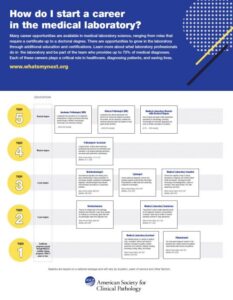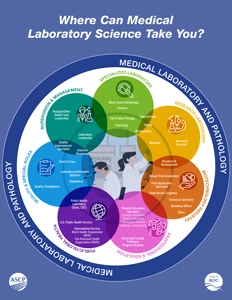Jump into an exciting, high-demand career in laboratory medicine.
Home
path forward?
school?
to college?
What does it mean to be a laboratory professional?
- It means being a critical part of a medical team.
- It means directly impacting every single patient who is diagnosed and treated.
- It means changing lives— including your own.
Ignite your future.

It just takes two.
You can become a medical laboratory technician in as little as two years after graduating from high school—getting you out of the classroom and into a great career. Fast.

Perks that add up.
Start exploring today to discover a variety of roles that challenge and inspire—and provide a comfortable income. Saving lives plus savings account? Now that’s inspiring.

Start fast. Go further.
These jobs are in demand all across the country, so you’ll have the flexibility to live just about anywhere you want. And because lab professionals have the ability to advance throughout their careers, your starting place doesn’t have to be your stopping place.
“Healthcare is the strongest job area of the economy right now, it’s a consistent creator of jobs; there’s so much demand for the services.”
John Challenger, CEO of Challenger, Gray & Christmas, Inc., an outplacement consulting firm.
Your next starts now.
Hear from professionals who found their next in a medical laboratory—and find out how you can do the same.
How can you prepare for life in the laboratory?
Where can you work as a laboratory professional?
How can you advance in your laboratory career?
What is the most rewarding aspect of working in the laboratory?
What do you want the public to know about the laboratory?
Join our numbers!
Careers in the medical laboratory have never mattered more—and the field is growing faster than ever!
7%
projected increase in medical laboratory careers between 2021-2031.
Source: U.S. Bureau of Labor Statistics
25,600
openings for new laboratory professionals are projected each year over the next decade.
Source: U.S. Bureau of Labor Statistics
100%
job placement reported by the National Accrediting Agency for Clinical Laboratory Sciences.
Find your next.
Click on the links below to learn more and find the career path that might be right for you.
The Laboratory’s Role in COVID-19
Phlebotomists, laboratory professionals, and pathologists play a critical role in healthcare; not just during a pandemic, but all the time.
Learn more about the role of the lab in the fight against COVID-19.
Educators.
Help your students find their next.
You play a vital role in helping students find the career that’s right for them. And we’d like to help you in your important work. For students who enjoy science classes, have a sense of discovery and enjoy helping others, a career in laboratory medicine can be a great choice. Click one of the buttons below to begin the sign-up process, and we’ll provide you with a unique set of tools to engage, educate and advise students on this career path!
Career Opportunities.
Click on each job title to learn more about their role in the laboratory.
TWO (2) YEARS OR LESS WITH A SALARY RANGE OF $30,000-$50,000
HISTOTECHNICIAN: Prepares and processes tissue samples for microscopic examination by a pathologist.
PHLEBOTOMIST: Works face-to-face with patients to draw blood samples and processes samples for analysis.
MEDICAL LABORATORY ASSISTANT: Performs clerical tasks, processes samples and provides support for clinical testing.
MEDICAL LABORATORY TECHNICIAN: Collects and processes specimens to perform routine tests in blood banking, chemistry, hematology, immunology, microbiology and/or urinalysis.
FOUR (4) YEARS OR MORE WITH A SALARY RANGE OF $60,000 - $100,000
CYTOLOGIST: Provide advanced diagnostic services and physician support by integrating morphologic interpretations with companion technologies.
HISTOTECHNOLOGIST: Prepares and performs routine and complex histologic techniques (i.e., enzyme histochemistry, immunohistochemistry, immunofluorescence) on tissue samples for microscopic examination by a pathologist to diagnose disease.
MEDICAL LABORATORY SCIENTIST: Conducts a full range of routine and complex laboratory tests in blood banking, chemistry, hematology, immunology, microbiology molecular biology and/or urinalysis to provide information necessary for the diagnosis and treatment of disease.
PATHOLOGISTS’ ASSISTANT: Provides anatomic pathology services under the direction and supervision of a pathologist to perform gross examination and dissection of surgical pathology specimens and performance of postmortem examinations.
SPECIALIST IN BLOOD BANKING: Performs all operations in the blood bank from routine testing to the most advanced procedures and are technical supervisors and laboratory managers.
TECHNOLOGIST IN BLOOD BANKING: Performs routine and specialized tests in blood banking and transfusion services to identify blood types and antibodies to support physicians in blood transfusion therapy.
TECHNOLOGIST IN CHEMISTRY: Performs analysis on blood and body fluids to determine the quantity of chemical and/or hormonal content in the specimen.
TECHNOLOGIST IN CYTOGENETICS: Prepare and performs chromosomal analyses on biological specimens to assist in the diagnosis, prognosis and treatment of acquired and inherited genetic diseases.
TECHNOLOGIST IN HEMATOLOGY: Performs tests to identify coagulation disorders, and studies morphology of blood constituents to aid in the diagnosis and treatment of diseases of the blood.
TECHNOLOGIST IN MICROBIOLOGY: Identifies bacteria and microorganisms in tissue samples and body fluids to aid in the diagnosis and treatment of infectious diseases.
TECHNOLOGIST IN MOLECULAR BIOLOGY: Performs molecular biologic methods including sequencing and proteomic analysis to characterize acquired and inherited diseases to help diagnosis malignant, metabolic and infectious diseases.
EIGHT (8) YEARS OR MORE WITH A SALARY RANGE OF $150,000 OR MORE
ANATOMIC PATHOLOGIST (MD): A physician who provides the definitive diagnosis of disease using a microscope, special stains, immunohistochemistry and other techniques.
CLINICAL CHEMIST, IMMUNOLOGIST, MICROBIOLOGIST, MOLECULAR BIOLOGIST (PhD): Provide laboratory oversight, regulatory compliance, consultation with clinicians and medical education as well as performs new test development, research, and ensures the quality in all testing.
CLINICAL PATHOLOGIST (MD): A physician who provides the definitive diagnosis of disease and specializes in blood banking, chemistry, hematology, immunology, microbiology and molecular biology. Provides advanced medical consultation with clinicians and interdisciplinary teams, laboratory oversight, regulatory compliance and medical education as well as performs new test development, research and ensures quality in all testing.
MEDICAL LABORATORY DIRECTOR WITH DOCTORAL DEGREE: Direct medical and public health laboratories specializing in microbiology, chemistry, immunology and molecular diagnostics and serve as clinical consultants to providers.
Learn about current career opportunities at the ASCP Career Center.
Interested in a career in the medical laboratory?
Start taking the right courses now! You should take a variety of science and math courses like biology, anatomy and physiology, physics and chemistry to help you prepare for course work in a medical laboratory program.

What is ASCP? Founded in 1922 in Chicago, ASCP is the world’s largest professional membership organization for pathologists and laboratory professionals. ASCP provides excellence in education, certification, and advocacy on behalf of patients, anatomic and clinical pathologists, and medical laboratory professionals. Learn more about who we are, what we do and how we can help you with a career in the lab at www.ascp.org.

